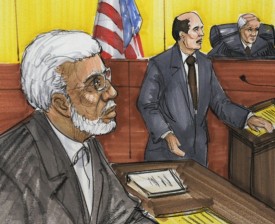
In this June 7, 2011 file courtroom sketch, Chicago businessman Tahawwur Rana, left, appears in federal court in Chicago. Rana is scheduled to be sentenced Thursday, Jan 17, 2013, in Chicago for backing terrorism in Denmark and supporting a Pakistani terrorist group that staged deadly attacks on Mumbai, India, in 2008. AP/Tom Gianni
CHICAGO — A Chicago businessman prosecutors say is a terrorist — who supported the group that staged an attack often called India’s 9/11 — faces decades in prison Thursday if a federal judge rejects defense arguments that he is a compassionate man who was duped by a friend.
Tahawwur Rana, 52, is being sentenced for his 2011 convictions of providing support to a Pakistani group that carried out a 2008 attack in Mumbai, India, that killed 160 people, as well as for his role in backing a never-carried-out plot to attack a Danish newspaper that printed cartoons of the Prophet Muhammad.
Defense attorneys are seeking no more than nine years in prison during his sentencing hearing Thursday in U.S. District Court in Chicago. Prosecutors are asking for the maximum 30 years, which, at his age, could amount to a life term.
Although Rana was acquitted of terrorism charges, the question of whether he should be considered one for sentencing purposes likely will be a focus of the hearing. Federal guidelines require stiffer sentences for those deemed to have engaged in terrorism.
Prosecutors argued in pretrial filings this week that the Pakistani-born Canadian fits the definition of a terrorist. They say he laughed in secretly recorded conversations at the prospect of victims being beheaded in Denmark and responded to the massacres in Mumbai by saying the victims “deserved it.”
Jurors cleared Rana of the third and most serious charge of involvement in the three-day rampage in Mumbai, India’s largest city.
Acquittal on that charge, prosecutors argue, doesn’t lessen the reality that Rana was bent on committing terrorism.
“The goal,” one of its filings said about the Danish plot, “was murder on a grand, horrific scale.”
The core of the defense argument is that Rana acquiesced to provide help to a key figure in the attack on Mumbai, David Coleman Headley, out of a misguided sense of loyalty going back to their days as childhood friends.
Headley, an American Pakistani who has pleaded guilty to laying the groundwork for the Mumbai attacks, was the star witness at Rana’s trial. He testified to avoid the death penalty and extradition. He will be sentenced next week in the same Chicago courtroom
Rana was accused of allowing Headley to open a branch of his Chicago-based immigration law business in Mumbai as a cover story and to travel as a representative of the company in Denmark. In court, a travel agent showed how Rana booked travel for Headley.
“The two continued their friendship throughout their lives,” the defense filing says. “But while Headley lived a life of crime and excess, Rana lived a full and productive life … starting several businesses, getting married and raising three children … This continued friendship and loyalty to Headley ultimately led to Rana’s downfall.”
The defense filing described his crimes as an aberration.
“Rana is a kind, hardworking, dedicated, charitable, compassionate family man,” it says. “He made the unfortunate mistake of becoming involved in the activities of his oldest — and most manipulative — friend.”
It added, “Rana is quite simply not a terrorist.”
Prosecutors blasted the notion Rana displayed any such naiveté, highlighting how in some of his communications he took pains to use coded language. Rana, the government filing said, had “engaged in extensive terrorist tradecraft.”
Far from being hoodwinked by Headley, Rana “made his own decision to participate … and, once he did, did so whole-heartedly.”
Prosecutors also sought to discredit letters Rana’s family, including his wife, sent recently to the judge describing Rana as a loving father and appealing for leniency.
Rana’s wife, prosecutors argued, held a different opinion of her husband until right before his arrest. They cite a secretly recorded conversation in which she calls Headley “absolutely crazy” and quickly adds Rana is much like him.
“They talk nonsense all day, idiots. That’s not how Islam spreads! . . . Such as, ‘Kill him, he is not practicing like us — kill him, do that to him, do this to him, he is like this,'” she allegedly says. “Is this how Islam spreads? … Hatred spreads like this, not Islam.”
At Rana’s trial, Headley spent five days detailing how he allegedly worked for both the Pakistani intelligence agency, known as the ISI, and Lashkar. Some observers had expected testimony could reveal details about alleged links between ISI and Lashkar, though much that came out in testimony had been heard before through indictments and a report released by India’s government.
The Pakistani government has maintained it did not know about Osama bin Laden or help plan the Mumbai attacks.